Part 20
Thanks to a recommendation of Hemogoblin's, this post will come in two parts, primarily because the second part will have a different narrator and viewpoint and such.
The next part should come the day after this part (I hope).
Fact Sheet - The Russian Empire - August 1362 AD
About two years before the death of Regent Lenin, the national bureaucracy, known then as the Russian Civil Service, finished compiling the first national census in human history.
Though it was the printing press which made the census possible, their manual data collection was prone to severe sampling errors. Many of the serfs, vagabonds, bandits, nomads, and merchants were not recorded, and even now, we cannot easily estimate their numbers.
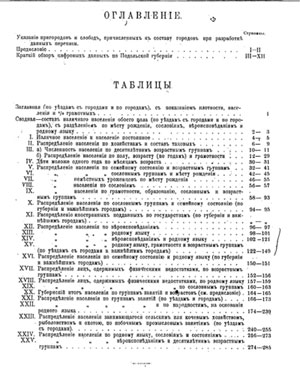
A reproduction of the first census. Note that Cyrillic characters were still used. The development of Russangxi was still almost two centuries away.
By looking at the records for grain production, the remains of graves, and the estimates of population density derived thereof, we can contrast The Russian Empire with its continental competitors.
But first...
An Overview of the Societal Structure:
Government: Hereditary Rule
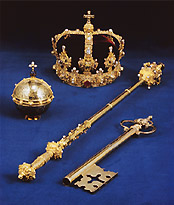
For nearly a millenium, the absolute power of the Tsar had been handed down from father to son. By the 1360s this genetic lineage had been broken by the liberal revolution, but through Lenin, the mantle of the Tsar had survived, and Hereditary Rule carried on for a little while longer.
Hereditary Rule normally entails that the ruler is answerable to nobody but his family; but with the proliferation of the printing press and liberalism, the people's voice had begun to have an effect.
Legal: BureaucracyAside posted:
Hereditary Rule gives all cities +1 happiness for each military unit stationed in them.
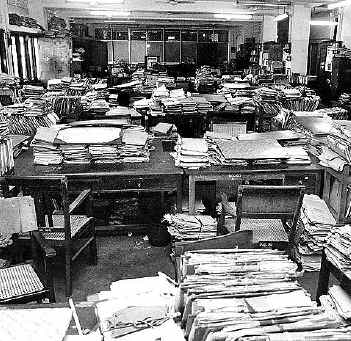
After centuries of operation, the Russian Civil Service had a hand in every aspect of the Russian government. While the Tsar chose state policy at a strategic level, the remaining roles of government--such as minor diplomacy, taxation, running the courts, policing, maintaining the garrisons, suppressing banditry, and building or maintaining infrastructure--were handled by the rote machinations of people pushing commands around on slices of paper. Nobody really ruled the Civil Service, and at some level, the only thing that guided its blind hands was a set of near-forgotten goals which were laid down during the Civil Service's foundation.
Like many organizations of its size and age, it was becoming lethargic and ineffective under the weight of self-regulation, and in time, it would rot from the inside out. Before then, however, it formed a stable core for the Russian Empire. Even during the worst years of the Tsar's quarantine or the upset of the liberal revolution, society was held together by the glue of bureaucracy.
Labor: SlaveryAside posted:
Bureaucracy gives my capital +50% production and +50% commerce.
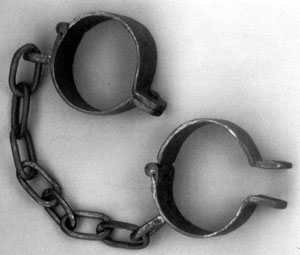
Though the Russian Empire had long ago ceased the massive labor movements which exterminated thousands of unlucky slaves, slavery was still practiced in the cities. Prisoners of war (and their descendants) were forced to complete the mundane tasks that kept the streets clean and the rich at ease. Furthermore, almost all roads, ports, and major buildings utilized slave labor as a cost-saving measure.
People have argued that Russia should have been considered a serfdom, but the Grand Duchies of Russia did not practice the same strict class system that Spain or China utilized; and some of the serfs, those which were part of the emerging middle class, owned slaves of their own.
Economy: DecentralizationAside posted:
Slavery allows me to kill population in order to rush production.
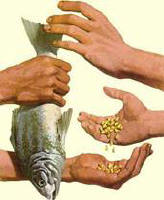
Despite taxing the Russian Empire, the government had never taken a role in attempting to direct the economy, not even for the purposes of preventing monopolies or exploitation. Though it wasn't quite a barter anarchy, it was undoubtedly a natural market, and the Russian ruble wasn't always in use.
Religion: TheocracyAside posted:
This is the default Economic choice and it does nothing.

Despite the liberal revolution, Russia remained theocratic. They had merely switched the official worship of the Brahman with the official contemplation of the Tao, which was to the discontent of the Hindus, Buddhists, Jews, and Confucianists that practiced throughout the Empire.
The NumbersAside posted:
Theocracy prevents me from spreading anything except for my state religion. However, all cities with my state religion produce military units with a free +2 experience points, representing the military might that religious causes can draw.
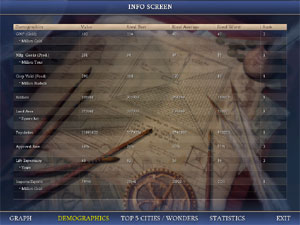
Click on me for an info screen!
The Death of the RegentAside posted:
Look at that! I'm kicking some serious ass, except in economic power. However, my "weak" economy is more than made up for by my vastly superior production.
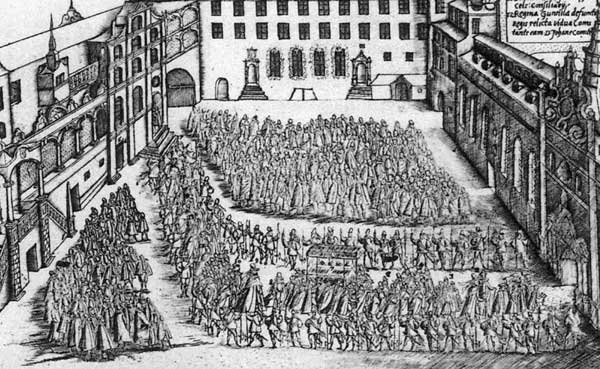
In September of 1362, the regent to the crown, Ilyvich Prostov Lenin, died due to the mechanical failure of an experimental weapon known as the gonne (short for Gonnehild, a Germanic surname which meant sword of war.) Though the gonne's inventor, Archimedes, was not charged with the death of the regent, a permanent guard was assigned to him, and he was forbidden to leave his rooms in the palace for any reason.
The initial reaction to this event was best summarized in the conclusion of an editorial published in the weekly pamphlet of the Great Library at Moscow, Speech.
Many speculate that if the liberals had immediately called for the placement of Boris or Protas as the executive of a new liberal government, they could have slipped into the power vacuum and bypassed the entire issue of succession. However, they were Taoists and held strong traditional values. If the crown was empty, they felt an emotional and patriotic imperative to see it filled before further steps could be taken. In effect, they wanted their heritage to recognize their government as a willing evolution of the old tradition--they did not want to be a band of usurpers.quote:
Though I considered Lenin to be a scoundrel and a eminent danger to the freedom of the Russian people, I believe his death couldn't have come at a worse time. Because he was without wife, relative, or personal will, his regency has no clear lines of succession, and even if this unfortunate accident allows the people their liberal government, it is my opinion that we cannot simply take the mantle of rulership without first obtaining the dignity of consent from the old government. That dignity cannot be obtained until the issue of succession is resolved, and we can answer the question, "Who is the Tsar that will empower the people?"
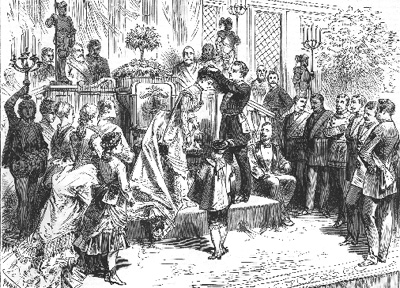
In the past, the crown had always passed from the Tsar to at least one of his sons, brothers, or nephews. Russia's royal line had been unbroken until the Tsar's quarantine and his capture at the end of the liberal revolution. The problem of succession had been ignored after that because it had been assumed that the popular liberal government would be eventually implemented.
For a month, nobody took any political action. As Archimedes wrote in his journal, "Without the will of a monarch, the nobility is frozen with uncertainty, but the bureaucracy still moves. The Russian Empire is too large and too busy to not direct itself while the politicians sort out who owns it."
Lenin's funeral was held in late October, 35 days after he had died. His body was placed in a litter and carried through the streets of Moscow, up through the gates of the Tsar's palace, and set before the throne for a week, after which he was entombed beside the previous Tsars. Embalmers had gone to work on preserving and decorating his corpse immediately after his death, but the damage he had suffered from the gonne's explosion had been impossible to mask. They had covered most of his body with a purple blanket, but the shrapnel wound on his cheek was not hidden. Onlookers saw death smiling through a withered hole in his relaxed face.
After Lenin's entombment, the first move in the political struggle for succession was made by a minor Denaturalist scholar studying architecture in Shanghai. His name was Dobrovit Denai, and several weeks prior, news of the regent's death and news of the fall of Parthian had reached him. He saw this as providence rather than coincidence, and he wrote the following message to a friend at the University of Moscow:
His message was intercepted by a nosy Taoist caravan driver, and a copy was sent to the Great Library while the original letter finished its journey to the University. When it arrived in Moscow, the news swept through the intellectual population like a wildfire through dry grass. The confluence of the end of the Russo-Chinese War and the death of the regent had an effect completely unlike what Denai had hoped. Rather than motivate the Denaturalists to bring home their hero and put him on the throne, they immediately set about the task of sending off most of their population to the Chinese provinces.quote:
Dear Isop,
Ishvara smiles upon us all. Vasnetsov has taken Parthian and the helmet of the Grand General of China. The war with China is over, and our two greatest problems are solved at once! The Buddhists will no longer oppress our Chinese brothers, and we have found a man worthy of being Tsar.
The throne, which by divine right is owed to the Hindus, should be given to Vasnetsov. Though he is old, he is still keen. Show your friends this letter. Convince them to bring the General back from China. If we give him the crown, he can decide who is fit to follow in his magnificent footsteps.
Their thinking was clear in a way that Denai's was not. The Denaturalists in Moscow knew that they had lost the popular battle against the liberals. Without an established line of succession, they couldn't possibly install a Denaturalist monarch. Vasnetsov wasn't a trained politician, and the liberals at the Great Library would refuse to accept his tenuous claim to the throne. Furthermore, the Denaturalists knew that with all the Taoist support in the south, some form of liberal government was inevitable in the short term.
They suspected that if they waited around, then their philosophy was doomed to be overwhelmed by the increasing size and success of the liberal movement. As a safety measure, they decided to seed themselves in the nascent governments and Hindu duchies of the conquered Chinese lands. They would entrench themselves in the protoculture of the northern half of the Russian Empire, so that they could return one day with the popular majority at their backs.
In short, they decided that it was time to retreat and regroup. They prepared generalized plans stretching ahead for generations, because unlike the liberals, they weren't just playing for control of Moscow, the throne, or the Russian Empire. At heart, they believed that they were taking the first steps towards improving the human race.
Duke Casimir Kavkas and the Liberal Compromise

Because the original Tsar had no direct descendents or siblings, members of the Great Library at Moscow traced his geneology outwards in order to discover the identities of his cousins and their descendants. Through marriage, the Tsar's family had recently made connections with the Duchies of Kavkaz, Grozny, Bombay, and St. Petersburg. In these duchies, 43 men of heritage were identified as potential successors to the Tsar. 22 of them were experienced politicians. Of those 22 men, a dozen immediately refused to participate in the succession, and another three were suspected of criminal behavior or corruption. Of the remaining seven, two were the Dukes of Kavkaz and Bombay, one was a prince in Grozny, two were the noble grandsons of the Tsar's eldest aunt, and two were clerks in the Russian Civil Service.
All things considered equal, at this point, everyone with influence should have selected the Duke of Bombay as the new Tsar. He had more experience than any of the other candidates, and his record was impeccable. However, he was a devout Hindu, and by relation, he was also a strong Denaturalist and Russian royalist. The Denaturalists published a couple of pamphlets suggesting that he take the throne, but the response in the streets of Moscow was severe. Various ringleaders swore to instigate public revolt if a Denaturalist came into power. After an effigy of the Duke of Bombay was burned in front of the palace gates, the Duke quietly withdrew his offer of succession, and the Denaturalists quickly forgot the man who merited the throne.
It slowly dawned on the scholars and nobles that they'd lost a degree of control over the political future of Moscow. Whatever decision they made would have to be accepted or rejected by the commoners, or else. The people weren't exactly literate, but thanks to the printing press, their ideas were becoming organized. For a few dollars, their manifestos were printed into pamphlets and distributed, and the overall effect was one of unification. They began to see themselves as a single political entity.
The liberals struggled to select the best choice from the remaining candidates, but none of them seemed suitable. As would be expected of members the Tsar's clan, all six were essentially royalists, and the liberals knew for certain that all but the Duke of Kavkaz and the prince of Grozny were Denaturalists.
Their dilemma was solved in what is now called the Liberal Compromise.
Duke Casimir Kavkaz published a pamphlet entitled, The Middle Road. This seven page work was supposedly written in three days, after Casimir had finished reading Bogumil Savostin's Government and Liberty. The pamphlet documented the fictional dialogue of a fisherman and a veteran of the Chinese war. They reflected on the contemporary issues, and argued with one another in the common vernacular about the future of the Russian government. As their debate continued, they found themselves at an impasse: the fisherman refused to trust a king with unlimited power because he believed that the king would forget about the people; and the soldier refused to trust a government ruled by the people because he believed that their collective will would be divided by differences of opinion. When all seemed lost and both men made ready to depart in anger, Duke Casimir introduced himself into the dialogue, and offered to act as an impartial judge to their conflict. The fisherman and the veteran repeated their arguments, this time at once and with great detail, and then Duke Casimir ruled:
The Middle Road quickly attained popularity on a scale never before or since seen in history. Though only five hundred thousand copies of the pamphlet were printed, that was twice the number of literate people currently living in the Russian empire, and sixteen times the number of copies of Government and Liberty printed. Before the end of 1365, over two-thirds of the populace had read or listened to the words of Duke Casimir Kavkaz.quote:
You are both correct. My good soldier, the fisherman is right. A king with unlimited power cannot be trusted to wield that power with any interest at heart but his own. But my good fisherman, the soldier is also right. If the people ruled, they would never agree on a single decision, and they would argue and bicker while the empire descended into anarchy.
Now do you understand? Neither the liberals nor the Denaturalists can be allowed to rule. The liberals would doom us to inaction, and the Denaturalists would doom us to the whims of madmen like the old Tsar. What we need is a third way, a middle road that combines the strengths of each philosophy in order to destroy their weaknesses.
Fisherman, let me ask you a question. Would you accept a king if you could advise him in the interests of the people?
The fisherman nods.
Soldier, let me ask you a question. Would you accept the advice of the people if you were the king?
The soldier nods.
Then the solution is obvious. We need a government ruled by a king, but advised by the people.
"But there are too many people and only one king. He wouldn't have the time to hear every opinion," the soldier said.
Yes, there are too many people to advise one king, but that's not a problem. The liberals have devised a system called a parliament, by which a few men may present the opinions of the people.
"But the king may not follow the advice of the parliament, just as the old Tsar ignored the opinions of his advisors," the fisherman said.
Yes, the old Tsar could ignore his advisors, but the new king cannot. If we place the liberal constitution above the law and the king, then everyone including the king will have to obey it; and in this constitution, we can require that the king always consider the opinions of the parliament, or else he will be considered a traitor to Russia.
The soldier and the fisherman contemplate the Duke's words. After a moment, the Duke mounts his horse and pulls on the reigns.
I must leave because I am needed in Moscow. Just remember what I told you when you relate this story to your friends: only by compromising and following the middle road can we justly rule an empire. Goodbye.
Historians attribute the massive success of the pamphlet to its unifying and pacifying nature. After a century of military conflict and political upheaval, the cultures of Russia, Russo-India, and China were exhausted. The fight between liberalism and the Denaturalists had strained the religious and economic ties between the various geographic regions of the Empire. Duke Casimir's ideas gave the whole empire hope for an end to these troubled times.
In January 1366, the liberals at the Great Library printed their official reccomendation for the next Tsar: Duke Casimir Kavkaz. The Denaturalists and royalists immediately agreed, and in a week, the Duke appeared in Moscow to be crowned.

The crowning of Tsar Casimir Kavkaz.
After being crowned at dawn, he immediately ordered the dissolution of the absolute monarchy, and in a public address to a crowd of ten thousand, he announced the formation of the constitutional monarchy. The Liberal Comprimise was complete.
In secret, Casimir had already met with both the liberal and Denaturalist leaders and convinced them that he was effectively the new Tsar. He told them, "The people will accept no substitute. All that remains is for you to publicly select me." He presented them with a revised copy of the Liberal Letters. This one included a third section dedicated entirely to the structure and restrictions of the crown, and the first two sections were revised in order to account for the people's new relationship with the king. The Denaturalists readily agreed to the plan; all that remained was the agreement of the liberals. After an hour of debate behind closed doors, they also agreed. Though we can't ever know for certain what they discussed, it is supposed that they believed liberalism had achieved all it ever would.
The Colossus of Delhi
In the decades immediately following the establishment of Russia's constitutional monarchy, the Russian Empire became invigorated. Productivity recovered as war weariness lifted, and the resultant economic boost nearly sealed the leaks on the Empire's treasury.
In Delhi, Duke Godse IV commemorated the prosperity by building a statue of Ishvara standing beside the harbor and facing into the sunrise. On the plaque at the base of the statue, these words were written, "May all roads through the deep lead to our nets." Myth has it that for almost a century afterwards, a Russian fisherman had only to dip his net into the ocean to catch a meal.

The Fate of ArchimedesAside posted:
The Colossus is a relatively early wonder, though I've built it very late into the game. If you notice, it'll become obselete after I discover Astronomy. For now, however, it fulfills an extremely important role: it boosts my economic power in my oceanside cities and ports, and makes up for a massive part of the maintenance that threatens to cripple my empire.
In 1390 AD, I have 934 gold. At 50% science, 50% taxation, I still lose 10 gold from the treasury every turn. And that's after I get the bonus from the Colossus. Prior to its completion, I lost over 30+ gold per a turn. Ouch. I've currently queued up some workers in my primary production cities, and I'm punching out cottages in China. My hope is that my economy will recover as the Chinese cities build courthouses, expand their borders to fill my half of the continent, and regrow cottages, villages, and towns.
Tsar Casimir was not a cruel leader, but he was a practical one. He released Archimedes's sons from imprisonment in the palace, but Archimedes and his wife were to remain locked away for the rest of their natural lives, though visitors were allowed.
The old genius grew senile. In the end, he forgot his wife, his sons, and the world around him. In 1374, his mindless body was put to bed, and after two months of the best care, it died in its sleep. Asma lived for two more years, and she swore on her death bed that she had waited almost nine years to join her husband. "He went on ahead," she said, "and left his body behind. We cared for it, of course, in hopes that he would come back, but he never did. Now I'm going to find him and see what he's been doing all this time."
In his honor, the disease of forgetfulness is called Archimedes Disease.
The Chapel of Heroes
In the late 1390s, one of Archimedes's sons, Leonardo Bebor, discovered an unfinished set of plans in his father's notes. The design was for a chapel of massive proportions, in which the great works of Russia would be honored. He called the building "The Chapel of Heroes," or the "Sistine Chapel" for short. It was going to contain a central dome covered in sweeping murals, including creation myths from every major religion and pictographic histories of the Russian people. Thousands of side rooms were planned in nine concentric rings, and each room would be devoted to a particular Russian hero, politician, or inventor. In the original plans, only sixteen of the rooms would be filled. The rest would be empty and waiting for the contributions of future heroes.
Leonardo Bebor finished his father's plans, and submitted them to Tsar Casimir for approval. Casimir agreed, and after an impassioned speech, the parliament unanimously voted to fund the construction of the Chapel.
The construction of the chapel involved some of the greatest artists to ever grace the Russian Empire. Even today, students of art and architecture flock to stare in wonder at the cosmic images and crawling details crammed into every corner of the building.
On the turn of the 15th century, the Sistine Chapel was completed, but instead of sixteen rooms being filled, seventeen rooms were filled. A statue of Archimedes stood under torchlight (now a natural gas lamp) and studied a collection of his great inventions. And as a subtle nod to the inventor's craftiest contribution, Casimir Kavkaz ordered the fragments of the first gonne to be placed at the statue's feet.
It would be almost two centuries before it was discovered that Tsar Casimir had elicited a confession from Archimedes in exchange for the freedom of his sons.
Aside posted:
My newest great person was a Great Engineer. Like other Great People, Great Engineers can be used to start golden ages and discover technologies. A Great Engineer can also settle as a super specialist (engineer), which gives the city +3 beakers and +3 production per a turn. Finally, a Great Engineer can be used to rush the production of a building or a unit in the city. I used him to rush the construction of the Sistine Chapel in Moscow.
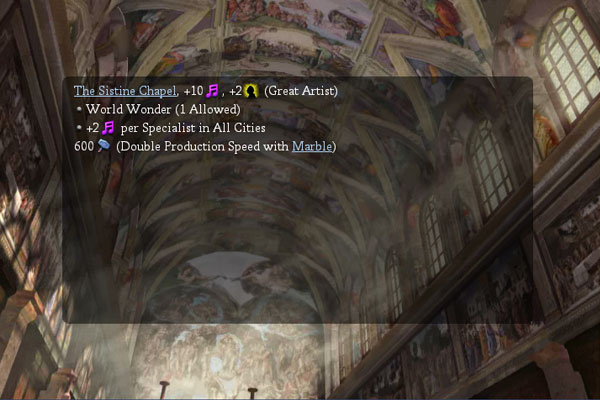
In 1995, a sociologist by the name of Ualentin Tabor wrote The Sistine Effect. He proposed that the presence of The Chapel of Heroes provided a small but significant incentive for cultural progress. He cited the staggeringly large number of historical figures that claimed they were inspired by their visit to the Chapel; and there is almost nobody enshrined in the Chapel who didn't visit it before they were honored with an exhibit there. In effect, everyone worked just a little harder because they hoped to become a member of the Chapel's history.
Looking Towards the FutureAside posted:
The Sistine Chapel makes all my specialists into effective cultural producers. Now whenever I finish capturing a city, I simply set one specialist, and no matter what, I'll get a border size increase in a maximum of five turns.
Bam!
For a time, the Russian Empire was at peace. Tsar Casimir commented in his journals about the state of affairs: "As I grow older, I am tempted to believe that Bogumil Savostin spoke too soon, but only by a handful of decades. Maybe the great upheavals of the past are finished, and the future will be a time of endless peace.
"But then I look at this letter from the Spanish Queen. I read it nightly. It troubles me. There is only one sentence on the page: 'Even when a fire looks dead, remember that hot coals still burn underneath the ash.' I wish it wasn't real.
"Ishvara damn the Buddhists!"
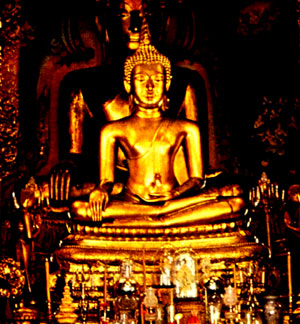
So far...
I'm cutting off this post here, because of what I said at the start. Here I'm going to switch narrative viewpoints to make the next events more entertaining.
Edit: Please tell me if the images fail to load. It may be time to seek another host, yet again. :[